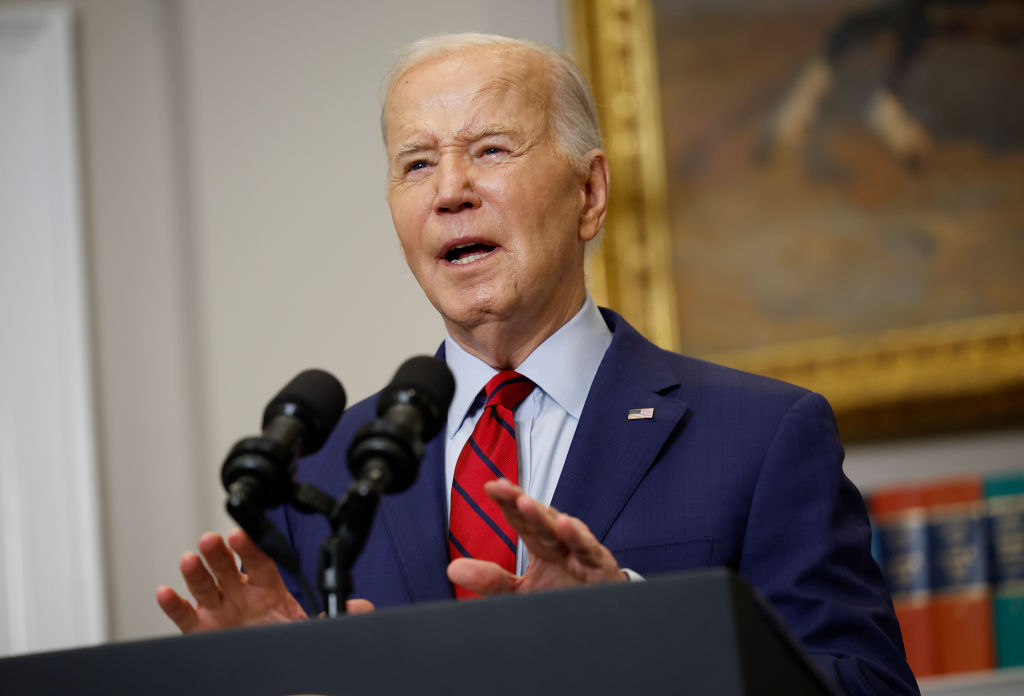Biden Administration challenges Texas’ sovereignty, not vice versa
Don’t believe everything you hear from the Democrat accomplice media about Texas’ border security efforts. It’s time to set the record straight and separate fact from fiction.
First things first: Texas is not defying the Supreme Court. Last week, the court overturned a lower court’s injunction that prevented the federal government from removing razor-wire fencing installed by Texas on the border. Unfortunately, the media coverage of this decision and Texas’ response was filled with errors.
For example, Vox’s headline inaccurately stated, “The Supreme Court Says No, Texas Can’t Use Razor Wire to Restrain Federal Agents.” And immediately after the court’s order and Texas’ commitment to continue using razor wire, the media started spreading the false narrative that Texas was disregarding the Supreme Court’s decision.
But both of these claims are incorrect. The Supreme Court did not say that Texas couldn’t install razor wire, and Texas did not defy the court’s decision because the court didn’t give any specific orders to Texas.
What the Supreme Court’s order did was lift the injunction that a lower court had placed on the Biden administration, allowing the federal government to remove Texas’ fencing while still allowing Texas to keep installing it.
Supremacy Clause Doesn’t Override State Sovereignty
The media has also been misrepresenting the significance of the supremacy clause. Members of the press, politicians, and academics are portraying the supremacy clause as giving the Biden administration an automatic advantage in any dispute with Texas. But that’s not what the clause actually does.
The supremacy clause, found in Article VI of the U.S. Constitution, states that the Constitution and federal laws are “the supreme law of the land.” This means that federal law takes precedence over state law, but it’s a complex issue to determine which state laws are affected and when. Simply invoking the supremacy clause doesn’t provide a clear answer about the legitimacy of Texas’ border security efforts.
Furthermore, those who claim that every action taken by Texas is an attack on our constitutional system are ignoring the fact that our Constitution recognizes both the sovereignty of the federal government and the state governments, with each having to respect the other’s authority, even if it’s a complicated balance.
Sovereignty, Supremacy, and the Standoff
The coverage of the standoff in Eagle Pass perfectly illustrates the inaccurate reporting surrounding the supremacy clause and the disregard for Texas’ sovereignty.
Eagle Pass, a border town in Texas, became the center of attention when Governor Greg Abbott declared a state of emergency and took control of Shelby Park. Under the governor’s directive, the Texas National Guard restricted access to the park, including for federal Border Patrol agents.
In response, the Department of Homeland Security (DHS), which had been using Shelby Park as a staging area for illegal aliens, sent two letters to Texas demanding unrestricted access to the park. These letters, along with Texas Attorney General Ken Paxton’s responses, expose the flaws in many of the legal arguments made by critics to condemn Abbott’s actions.
In its first letter to Texas, dated January 14, 2024, DHS demanded that “Texas cease and desist its efforts to block Border Patrol’s access in and around the Shelby Park area and remove all barriers to access in the Shelby Park area.” DHS justified this demand by claiming that “the State of Texas [has] impeded operations of the Border Patrol” and that Texas’ actions “conflict with the authority and duties of Border Patrol under federal law and are preempted under the Supremacy Clause of the Constitution.”
DHS also added, “Texas’s actions also improperly seek to regulate the federal government,” and argued that the entire area where Border Patrol was denied access is within 25 miles of the international border, which grants Border Patrol an express statutory right of access without a warrant.
While Border Patrol does have authority and duties related to immigration enforcement, Texas’ decision to block access likely did interfere with DHS’s operations. However, the supremacy clause does not give DHS the power to simply take over private or another sovereign’s property by demanding it. (Emergency situations present different considerations, but Texas maintains that Border Patrol can access any part of the park in an emergency.)
DHS knows this, which is why their initial letter to Texas referenced two different theories to justify Border Patrol’s access to the park. First, they claimed that a Memorandum of Agreement between DHS and Eagle Pass in December 2015 granted DHS continuous and uninterrupted access to all gate locations.
Whether that Memorandum of Agreement actually gave DHS a property right in Eagle Pass is unclear. Texas argues that under the state Constitution, Eagle Pass couldn’t grant Border Patrol a property right without the state’s approval. A court might have to decide whether the Memorandum of Agreement grants DHS unrestricted access to Eagle Park, but that dispute has nothing to do with the supremacy clause.
Secondly, DHS claimed that Border Patrol has an express statutory right of access because the Shelby Park area is within 25 miles of the international border. However, as Paxton emphasized in his response letter to DHS, the federal statute that authorizes “U.S. Border Patrol warrantless access to land within 25 miles of the border” specifically states that such access is “for the purpose of patrolling the border to prevent the illegal entry of aliens into the United States.”
On the contrary, DHS is trying to facilitate illegal entry and use the property to process migrants. Therefore, that statute does not grant DHS the access it demands.
In response to Paxton’s letter rejecting DHS’s demands, DHS sent a second missive. This time, the federal agency made no mention of the supremacy clause or a statutory right to access the property, which tacitly admits that their initial arguments were baseless. Instead, DHS claimed that the federal government actually owned the property in and around Eagle Pass, having obtained title through condemnation.
To support this assertion, DHS referred to a final judgment from 2016 that showed the George W. Bush administration acquiring ownership of various plots of land in and around Eagle Pass. If the federal government does indeed own the disputed property, Texas stated that it would remove any obstructions to federal land.
However, Texas expressed serious doubts about the federal government’s claims of property rights. Paxton pointed out that DHS’s own map “shows most of the tracts you reference fall outside the perimeter area secured by Texas at Shelby Park.” Furthermore, publicly available records suggest that the United States does not even claim ownership of the parcels mentioned in the latest letter. Paxton concluded his response by requesting DHS to provide official plat maps and deeds identifying the property owned by the United States, as well as an explanation of how Texas is preventing federal agents from accessing those parcels.
DHS has yet to respond, but this exchange confirms that it is the Biden administration encroaching on Texas’ sovereignty, not the other way around.
If the Biden administration truly owns the disputed property, it could have proven it long ago instead of relying on the supremacy clause. The Constitution allows for condemnation proceedings, and Congress has granted the U.S. government the authority to acquire ownership over real property when necessary to control and protect U.S. borders, with the property owner receiving fair compensation. In fact, the federal government gains rights to the property upon filing the condemnation petition, ensuring prompt access.
Texas may not be pleased with the Biden administration taking ownership of Shelby Park through condemnation, but that’s where the supremacy clause comes into play. Federal law is the highest law of the land, and Texas’ sovereignty now takes a backseat.
The fact that the Biden administration hasn’t utilized the power to condemn Shelby Park suggests that the president knows most Americans wouldn’t approve of the federal government seizing a park to create a camp for those illegally entering our country.
DHS can avoid this spectacle if it can prove that a previous administration already obtained title to the disputed property. But even if that’s the case, the Biden administration’s battle with Texas over border security is far from over.
rnrn
What are the complexities surrounding the legal arguments regarding access to Shelby Park in the standoff in Eagle Pass
In their letter. Texas asked DHS to provide proof of ownership and warned that if the federal government did not provide evidence, Texas would maintain control of the land.
This exchange of letters highlights the complexity of the situation and the misuse of the supremacy clause to justify federal overreach. The media’s portrayal of Texas as an aggressor disregards the legal arguments and the legitimate concerns raised by the state.
Conclusion
It’s crucial to separate fact from fiction when it comes to Texas’ border security efforts and the media’s coverage of the situation. The Supreme Court’s recent ruling did not prohibit Texas from installing razor-wire fencing, and Texas did not defy the court’s decision. The supremacy clause does not automatically give the federal government an advantage over the state, and it does not negate the state’s sovereignty.
The standoff in Eagle Pass exemplifies the misrepresentation of the supremacy clause and the disregard for Texas’ rights. The legal arguments surrounding access to Shelby Park are complex and cannot be simplified to a mere conflict between federal and state authority.
It is essential for the media and the public to approach this issue with nuance and an understanding of the legal principles at play. Texas has valid concerns about border security and the impact of illegal immigration on the state. Dismissing these concerns as unconstitutional actions undermines productive discourse and hinders progress towards solutions.
Instead of perpetuating misleading narratives, it is imperative to have informed discussions that respect the sovereignty of both the federal government and the individual states. Only through open dialogue and an accurate understanding of the law can we effectively address the challenges at the Texas border.
" Conservative News Daily does not always share or support the views and opinions expressed here; they are just those of the writer."





